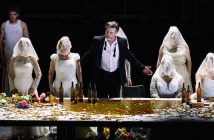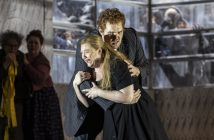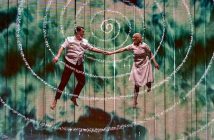The ENO has been going for 85 years but this is its first ever production of Norma. There are several reasons for this. First, Bellini’s bel canto style (literally, beautiful singing) fell out of favour as his successors produced richer orchestration and – to some degree – more gritty realism in their plots. Perhaps more importantly, its leading role is fiendishly difficult not just in the complex, long melodies Norma sings but in her almost constant presence on stage – this role takes stamina. It was written for one of Bellini’s favourite sopranos, Giuditta Pasta. Afterwards, there were few who dared to take on the role (and many who did, regretted it) until Maria Callas made it her own and reintroduced Norma to audiences worldwide.
The company has chosen its Norma well. This is Marjorie Owens’ UK debut and we can only hope to see more of her. Her voice is rich and powerful and she seems to have lungs fit for a free diver. She takes Bellini’s long, melodic complexities in her stride and has particularly spectacular high notes. Her first main aria – and the one everyone knows from Norma – Casta diva (translated as “Virgin goddess” here and inevitably losing the double meaning of diva as both a soprano and a divinity) was utterly thrilling. Even though it was delivered sitting on a chair on a half raised tree trunk. Why, oh why? Tchaikovsky wrote that Bellini’s melodies evoked emotions “so strong that they made me cry.” At this performance, there were loud guffaws from the audience at several points when the production seemed bent on making the scenes on stage farcical despite the best efforts of the singers.

So, briefly, the plot. Norma is a Celtic druid priestess, daughter of the local chieftain. They are under the rule of the Romans and Norma has fallen in love with the proconsul Pollione and secretly borne him two children. Pollione has transferred his affections to another priestess, Adalgisa who does not know of Norma’s “marriage” to him as they’re all supposed to be virgins. When she confesses, Norma decides to wreak revenge on Pollione but Adalgisa persuades her to wait – she will persuade him to return to Norma. The tribe meanwhile, is keen to rebel against their oppressors, but are held back by Norma’s prophecy that the time is not right – she is still secretly hoping Pollione will return to her but he won’t. Norma considers killing her own children but decides instead she will kill herself. Pollione appears, still fixated on Adalgisa despite her rejection and Norma tells him not only he but all of the Romans will be slaughtered. Adalgisa, too, must be a sacrificial victim having violated her vows. However, Norma has done exactly that herself and in a dramatic change of heart announces she herself will be the victim. Pollione’s love is rekindled by her nobility and he joins her on the pyre.
The ENO is using the Opera North staging which has updated events to an uncertain period. The Druids appear to be Civil War-era Puritans judging by Sue Wilmington’s costumes and designer Charles Edwards has used plain wooden chairs and Shaker-style pegs for their round hats. As they then become extreme idolaters (back to that tree), this seems an odd choice as a less idolatrous bunch than the Puritans would be hard to find. The Romans are from a later era. Top hatted and frock coated, they’re a pair of Old Etonian cads, complete with silver-topped canes, hip flasks and the original broad-sheet Times to read when the Druids are being passionate and pagan. Poor Flavio, Pollione’s friend, is made to smoke cigarettes almost all of the time he’s on stage, but did no-one consider the poor chap’s voice?

Christopher Alden directs, with the action taking place in a forest; in this case, a barn-like wooden box with two small high windows. And then there’s the tree. A massive trunk, covered in runes, is suspended by ropes from the ceiling. The Druids worship it, prostrate and swoon before it, stroke it. Eventually, it responds by rising up to a 45 degree angle accompanied by ribald laughter in the audience. In case we miss out on phallic imagery, later on we get an on-stage castration of poor old Flavio.
In the end, though, this is a show that is all about the singing. Owens is phenomenal but Jennifer Holloway as Adalgisa sings beautifully and I suspect is a rather better actor than she’s allowed to be here. Peter Auty as Pollione grows in stature in the second act, and James Creswell as Oroveso, Norma’s father, and Valerie Reid as her confidante, Clothilde are in fine voice. The chorus is magnificent. It is an evening of superb singing – and that overcomes all the silliness of the staging.
Norma at the London Coliseum, St Martin’s Lane, London WC2N 4ES, until 11th March 2016. Running time three hours. For more information and tickets visit the website.




